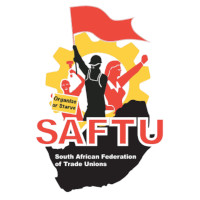Like the rest of our society, SAFTU cannot but be doubtful that any of the promises we heard from President Cyril Ramaphosa in his State of the Nation Address (SONA) will be kept, and like all within the working class, we are disgusted that he is once again showing his pro-corporate bias. The SONA was thus a profound disappointment, though not in the least surprising given the adverse balance of forces our class now faces.
In the very real problem of “State Capture,” President Ramaphosa’s administration has found a perfect scapegoat. This is not to understate the impact graft during the Mbeki and Zuma years, and how much its impact is felt in the crises at Medupi and Kusile power plants – through which Hitachi bribed the ANC – and Transnet, which faces crippling parts-shortages for more than 15% of its 1000+ locomotives purchased in a deal rife with China South Rail over-pricing and bribery, thus destroying the supply relationship with the Beijing firm. A new State-Owned Enterprise agency and Minister of Electricity will not solve these crises: the suppliers and financiers of the deal – Western funding agencies and banks, plus the China Development Bank, respectively – must be held accountable.
But the harping about state capture is a recognition President Ramaphosa’s administration cannot account for its own failures – and let’s not forget that Ramaphosa served under Zuma from 2014-18 and himself has a case to answer for his own Phala Phala financial improprieties, according to Parliament’s own investigation late last year. So we are all unimpressed when Ramaphosa explains away our crises with that State Capture mantra: the wasted 9 years.
SONA has proved us right in its repetition of old, hackish ideas, and the premising of supposed solutions for the current crises we face in this country, based on the ideology of neoliberal capitalism.
Electricity crisis
Besides agreeing with us only on one point — fixing Eskom’s coal-fired power stations and improving the availability of existing supply — the President has introduced a Minister of Electricity, without dealing properly with corruption at the Ministry of Mineral Resources and Energy. The Zondo Commission noted DMRE is run by a man, Gwede Mantashe, whom Bosasa gave favours to and deserves investigation and potential prosecution. A new state-owned company to consolidate SOEs is merely institutional tinkering, and a vote of No Confidence in the current Minister of Public Enterprises, Pravin Gordhan.
Ramaphosa also parroted other strategies in his energy plan of July 2022. The energy plan, as we remarked last year, is riddled with solutions that seek to privatise the energy provision in this country.
For instance, he proposes to “enable and accelerate private investment in generation capacity” and “accelerate procurement of new capacity from renewables, gas and battery storage.” This is the old plan to unbundle and privatise the energy generation division by auctioning it to Independent Power Producers, at a very high financial cost to the fiscus and consumers. In the recently approved tariff of 19,56% for example, 1/3 of the constituent cost is going to procurement of electricity from the IPPs. There is no reason Eskom cannot be reconstructed to focus on renewable energy instead of outsourcing it at an enormous profit mark-up to mainly overseas investors who insist on payment in increasingly-expensive hard currency.
In our SONA expectations, we reiterated our opposition to the IPPs and expected the government to be the one championing “renewable energy capacity”, and not be auctioned to IPPs “through the Renewable Energy Independent Power Producer Programme (REIPPP).”
In addition to the solutions being proposed to deal with the energy crisis, President Ramaphosa has declared the national state of disaster over the energy crisis. This has its advantages and disadvantages.
The disadvantages of this declaration lie in the possible abuse of process, as disaster management allows the state “to accelerate energy projects and limit regulatory requirements”.
In this context, so reminiscent of the conditions in which former Health Minister Zweli Mkhize abused the Covid-19 emergency in 2020-21, do we really need a national State of Disaster? We can anticipate that Ramaphosa will dispense with regulations protecting workers, communities and the environment from the energy industry’s terribly abusive practices – such as toxic pollution that kills several thousand residents and workers near Highveld coal-fired power plants, coal mines, smelters and refineries annually, as well the industry’s greenhouse gas emissions that cause so much damage. We can assume that the state will now more frantically cut dubious deals such as Mantashe’s R215 billion Karpowerships, or the offshore exploration desired by Shell and Impact Oil & Gas (and we know that both have been generous benefactors to the ANC and CR17, respectively). We can anticipate the fracking of the Karoo. There may be a new generation of methane gas plants such as at Richards Bay, even though the closest source would be “Blood Methane” from northern Mozambique, and notwithstanding that as a greenhouse gas 85 times worse than CO2, that methane will surely lead to the Western trading partners’ climate sanctions. We may even see new coal-fired power plants, as Ramaphosa had proposed for Musina-Makhado Special Economic Zone. Perhaps we will suffer a revival of Zuma-era nuclear energy fantasies with Russian suppliers, given the relationship Pretoria has with Moscow.
The problem with a State of Disaster, is that society’s oversight against such abuses is curtailed, and the likes of Digital Vibes and PPE-procurement scandals are likely to re-emerge.
The advantages would include the government’s ability to tap into funds it will otherwise not be able to touch under normal circumstances. If this money is not squandered like Covid-19 relief funds, it could really compensate and recapitalise small and medium enterprises that are struggling due to increased input costs due to procuring fuel for medium generators or that have already closed. Internet cafes and small fast-food outlets suffered most, closing and shedding few jobs they had created. Township and rural women – whose unpaid labour keeps our workforce fed, warmed and rested – would be the ideal beneficiaries of a much larger Free Basic Electricity supply, though Ramaphosa mentioned no specific energy-access relief for poor and working people.
On the contrary, the main way in which Treasury is now instructed to mitigate the terrible 18.7% price increase for 2023, is through tax breaks which will mainly benefit wealthier (and whiter) businesses and households. In the world’s most unequal society, low-income businesses and homes can still not afford the substantial capital required for small-scale generators, solar panels and uninterrupted power supply, which typically cost in excess of R100 000.
If leadership really wanted to serve the society instead of special corporate interests, a state of disaster could facilitate energy rationing. That way Eskom could ensure that labour-intensive firms, small businesses, informal settlementsand working households are victimised far less by load-shedding and “load reduction.” Energy rationing would then consider the real contribution to the economy – including the big corporations’ capital-investment strike, offshoring of profits and pollution – when distributing scarce electricity, in contrast to the current arrangement in whichthe big corporations are already benefiting from special tariffs at ridiculously low levels. The Energy Intensive Users Group of 27 companies consumes 40% of electricity but only provides 20% of economic output and less than 5 percent of the country’s employment.
Energy poverty
SAFTU is disappointed that President Ramaphosa did not move to override NERSA on the 18,56% approved tariff increase for April 2023, or at least instruct the Minister to subsidise poor households wholly.
He also said nothing about formalising informal settlements and connecting them to the electricity grid, in order to put an end to the dangerous connections that continually electrocute children in informal settlements.
Since Eskom stopped its passive-solar hot water scheme for townships a decade ago, we have simply not seen the state make good on its promises to alleviate energy poverty. The 50kWh/household/month Free Basic Electricity is not being provided to most households who really need it – and double or triple that amount – because of onerous “means testing.” And the 2020 ANC “Economic Reconstruction” policy on household energy was clear: women’s cooking and heating will in future be based not on clean electricity, but on dirty, dangerous paraffin and methane gas, or wood or coal.
Employment creation
In previous statements, we have urged the government to “drive a reindustrialisation program” by amongst others “powering the idling manufacturing capacity” in order to increase production and create jobs in the process. In some cases that may well require the state facilitating worker takeovers of firms whose owners are milking the assets and taking profits abroad, or even nationalisation.
But SONA just celebrated a few scattered investments, which often do not even lead to sustainable creation of employment. This is because new investments come with restructurings that tend to retrench workers. The investment of Central Bottling Company – an Israeli-based company – in Clover illustrates this tendency. It was an investment that President Ramaphosa celebrated in 2019, but in 2021, Clover had began a restructuring that butchered more than 2 700 jobs. Employment in quarter 3 of 2022 – the last available data – had not returned to the pre-Covid levels even though the economy had surpassed its pre-Covid output level. Ironically, Ramaphosa claimed that “competition merger agreements have provided … more food to be bought from local farmers”, yet in the acquisition of Clover by CBC, local dairy farmers were pushed out of business in the North West.
The deindustrialisation that accompanied neoliberal economic policies at the advent of liberal democracy, means South Africa is retreating to its colonial-era character:multinational corporate extraction of raw materials and natural resources for export, with workers paid poverty wages and forced to live in misery. From the Portuguese slavers to the Dutch East India Company invaders to the Rhodes and Oppenheimer mining empires, we have seen this economic system before, and we insist on liberating our economy from this scourge.
President Ramaphosa said little except to celebrate the local manufacture of a drinking glass. This economy continues to revert to the legacy of colonialism, in which the manufacturing sector for the refining and conversion of minerals into finished products was virtually non-existent, and any progress achieved during the country’s industrialisation from the early 1930s-70s, evaporates. South Africa’s manufacturing to output ratio falling from 25% at peak in 1981, to less than 12% since 2019, with nearly all of that decline occurring since neoliberalism was imposed by the last apartheid government in 1990. SAFTU has argued previously that herein – in beneficiation of minerals and in meeting basic needs for clothing, textiles, footwear, appliances, electronics and other goods once “made in South Africa” – lies the opportunity to reindustrialise and to create jobs on a scale we have never seen before.
Further, SONA was mum on the job guarantee scheme, aside from the emergency Covid short-term measures which Treasury is now erasing through austerity. Job guarantees could become a programme oriented to achieving social justice and environmental protection, such as climate-proofing our cities and countryside. We have so many reasons to create mass public works with decent wages, to give the majority of economically-marginalised people – about 12 million – a form of income. The need and space for such a programme is obvious across the public sector. For example, creating security posts for all schools in the country, or for the railroads and other infrastructure suffering from cable theft or senseless vandalism. In addition to the fact that the security personnel will earn an income, this will also save our educators who are increasingly operating under threat from intruders who attack them within school premises, and save our public infrastructure from its current rapid deterioration.
The Presidential Employment Stimulus only provides temporary relief to those 150 000 unemployed youth, for at most five months and at a pittance of a salary, and thereafter tosses them back into unemployment and pauperism.
State Owned Enterprises
Ramaphosa is correct that “many of our SOEs are struggling with significant debt, under-investment in infrastructure, the effects of state capture and a shortage of skills.” However, what is surprising is that with 2,7 (out of 7,7 million unemployed using the official definition of unemployment) of unemployed graduates languishing in a pool of unemployment, we cannot be short of skills in SOEs.
Our call is still clear: allocate more funds to SOEs to recapitalise them. But we recognise that throwing money onto SOEs alone does not solve their problems. In fact, that is one of the reasons why the SOEs continued to worsen even when the Treasury provided some liquidity through contingent allocations. Therefore, the managerial structures will have to be changed, and a new working culture cultivated geared towards returning our SOEs to their glory days.
Since the President did not instruct the Minister of Finance to revise the budget to “allocate money required to capitalise the SA Post Office” in order to “saturate it with sufficient liquidity that will allow it to modernise and buy the latest technology”, we hope the Minister Godongwana will do when he delivers the Budget Review on 23 February 2023. In our pre-SONA statement, we projected that this much needed liquidity “will enable [the SA Post Office] not only to regain the market it has lost to private companies, but also provide postal service with efficiency and to the satisfaction of customers.”
Cleanse corruption
President Ramaphosa revealed that “163 out of 257 municipalities are dysfunctional or in distress due to poor governance, ineffective and sometimes corrupt financial and administrative management and poor service delivery.” Every member of the community knows this for it is them who die due to potholes, live with uncollected refuse and still have to keep up with bucket systems, 29 years into democracy.
The point is not enlist these sufferings, but for the president to offer concrete solutions to their plight. But “enhancing the capacity of public representatives and officials, maintaining and upgrading local infrastructure, and invoking the powers of national government to intervene” is not a new thing. Those powers have always been there, that’s why some municipalities have been put on administration in the past. In question here is not only the skill and capacity to work, but whether members of ANC leading all spheres of government, who are soaked and saturated in corrupt practices, will not continue to prey on money allocated for service delivery.
SAFTU welcomes the court ruling in the Eastern Cape, where an official was sentenced to 10 years in prison for tender corruption relating to Covid-19 funds. In our view, these are the best moves that will help us cleanse corruption. In addition, they must seize properties, if any, that may have been acquired with these funds. They must also convict and sentence those hyenas that worked with him.
Israel-Palestine
Resembling the dishonest and hypocritical position of the United Nations (UN) on Israeli-Palestine conflict, President Ramaphosa said “we [him and the ANC] are greatly concerned at the recent escalation of tensions between Israelis and Palestinians, and call for an end to hostilities and for a resumption of the stalled peace process.”
This timid approach – seemingly influenced by his desire to please and convince his critics for SA’s position on the Russian invasion of Ukraine that he is consistent – is equalising Palestine and Israel in the conflict. In the conflict, Israel is not equal to Palestine: Israel is the aggressor and the invader, and Palestine, the victim and the invaded. We can’t sugar-coat this truth in a language of neutrality.
Way-forward
Like we remarked, SONA just mimicked “the economic frameworks of neoliberal capitalism that ANC is so committed to.” They promise development only if it guarantees the private sector opportunities for accumulation. The working class organisations must unite to coordinate a protracted struggle in response.






